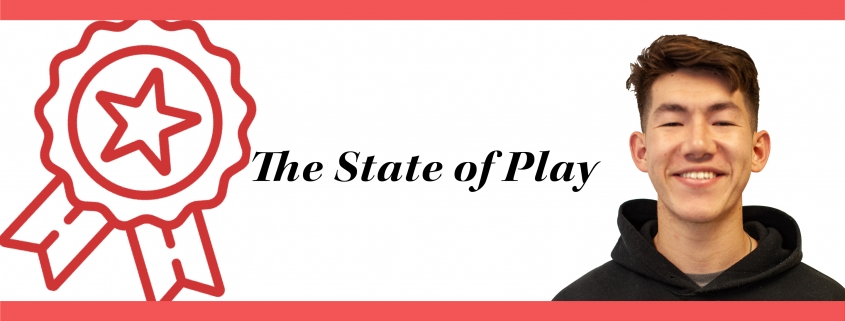The State of Play: Politics and sports have always mixed
Two weeks ago, I wrote a column with the headline ‘Politics in America looks like the Astros.’ In the column, I wrote a lot about Houston Astros owner Jim Crane, a little about President Donald Trump, and concluded that in light of the parallels between the two schmucks’ feckless behavior, America’s pastime and America’s nightmare look similar right now.
In response, I received the following message from a reader: “Sports and politics do not intersect in or out of your article.”
I cannot adequately express how baffled I was at this response. Yes — the degree to which I was taken off- guard surpassed shock, took a detour at confusion and found a home at the hyperbolic state of sheer bafflement. Not since the results of my last economics final have I felt so utterly perplexed at someone’s response to my work.
However, for many Americans, and apparently the aforementioned reader, this opinion does not elicit bafflement but is instead an accepted fact of life. For many readers from this subset of American society, the idea that sports and politics don’t mix is just as tried-and-true as other classics such as ‘Minorities are too loud these days’ and ‘Don’t women already have enough rights?’
So, in a last-ditch effort to set the record straight on this issue before we all leave for spring break, I would like to make two arguments. First, sports does intersect with politics — quite often, actually — and second, this intersection serves a crucial function in American life.
Now, seriously, does sports really intersect with American life?
To that I say yes, yes, a thousand times and forever, yes; and for evidence, please look no further than the nearest television or phone screen. In case you aren’t already painfully aware, coronavirus is here, and it’s not only at airports and cruise ships, but it might even be coming to a basketball stadium near you!
In a memo sent Saturday, the NBA asked each of its teams to have plans in place by Monday to handle the spread of the virus. The memo also recommended that teams’ traveling parties, which often include guests and support staff, be limited to “essential individuals only.” No plans have been made to cancel games yet, but the league is already asking teams to come up with contingency plans if one of them decides to ban spectators from games.
That’s right, basketball’s greatest stars might be playing in front of a grand total of no one in the not-so-distant future! And it’s not only the NBA that’s taking notice of the implications of the virus’s spread but also the International Olympic Committee. The 2020 Olympics might be canceled, and if that alone doesn’t sound crazy enough for you, please consider that the games have only been canceled three times ever in their history, each time because of a World War.
Also, if you’re about to come at me with the argument that coronavirus isn’t political because it’s a matter of public health and not political debate, please stop before you embarrass yourself. Yes, the virus was not formed by government policy, but its relentless spread might have been allowed by the failures of government policy. Also, who is supposed to be coordinating a national response to the pandemic? Bingo, it’s the Trump administration, which I believe is now reconsidering its political stance on vaccines!
This year, it’s coronavirus. Last year, it was a near-international crisis caused by Houston Rockets general manager Daryl Morey. In 2018, the Winter Olympics nearly brought forth a period of detente between North and South Korea. Prior to that, we had Colin Kaepernick’s kneel-heard-round-the-world and LeBron’s ‘I Can’t Breathe’ T-shirt.
Hell, if you still believe that sports and politics don’t intersect, just buy a ticket to an NFL game. Yes, those are military grade fighter jets roaring over your head right now. No, they are not legally obligated to do that.
Don’t worry, hypothetical angry reader, I already hear your concern: “Of course sports and politics intersect, you lib-tard! That’s the biggest problem with sports nowadays. Also, where are the keys to my Ford Super Duty?”
This is where considering the purpose of sports is important. For some, sports is just a form of entertainment, an opportunity to escape from life’s many stressors.
I happen to agree with that statement. Few things in my life have provided me with more joy than College Football Saturdays, and that joy is only heightened when it comes after a long day of studying.
Sports do entertain, yes, but they are also a powerful unifying force in American life, one that brings together Americans of all different races, incomes, genders and generations for the shared enjoyment of rooting for the local team or simply watching the game.
In the words of sports journalist Louisa Thomas, sports also unites Americans by conveying and shaping our shared understanding of competition and fair play. From a young age, sports teach us not to cheat, to work with our teammates and to respect the opposition.
Politics transforms these values into real and effective policy, and it is for this reason that the intersection between sports and politics, whether brought on by calamity or Kaepernick, is not only undeniable but essential to understanding and improving American society.
Stuart Carson is a junior writing about the intersection of sports, politics and American society. He is also a sports editor at the Daily Trojan. His column, “The State of Play,” runs every other Wednesday.

